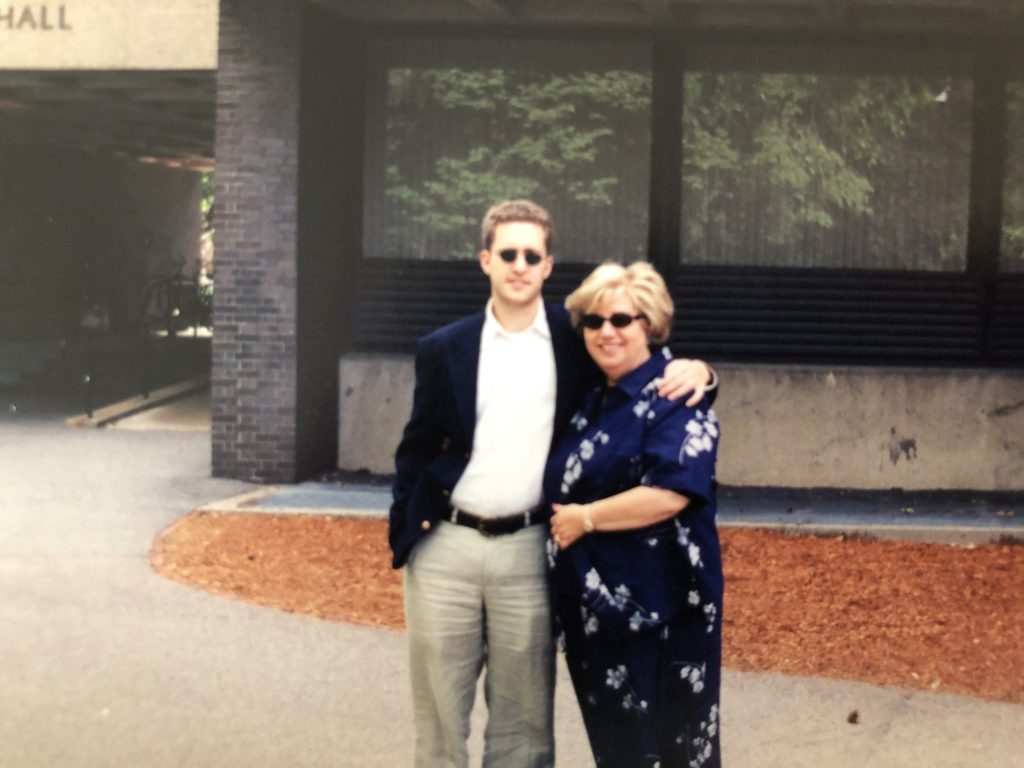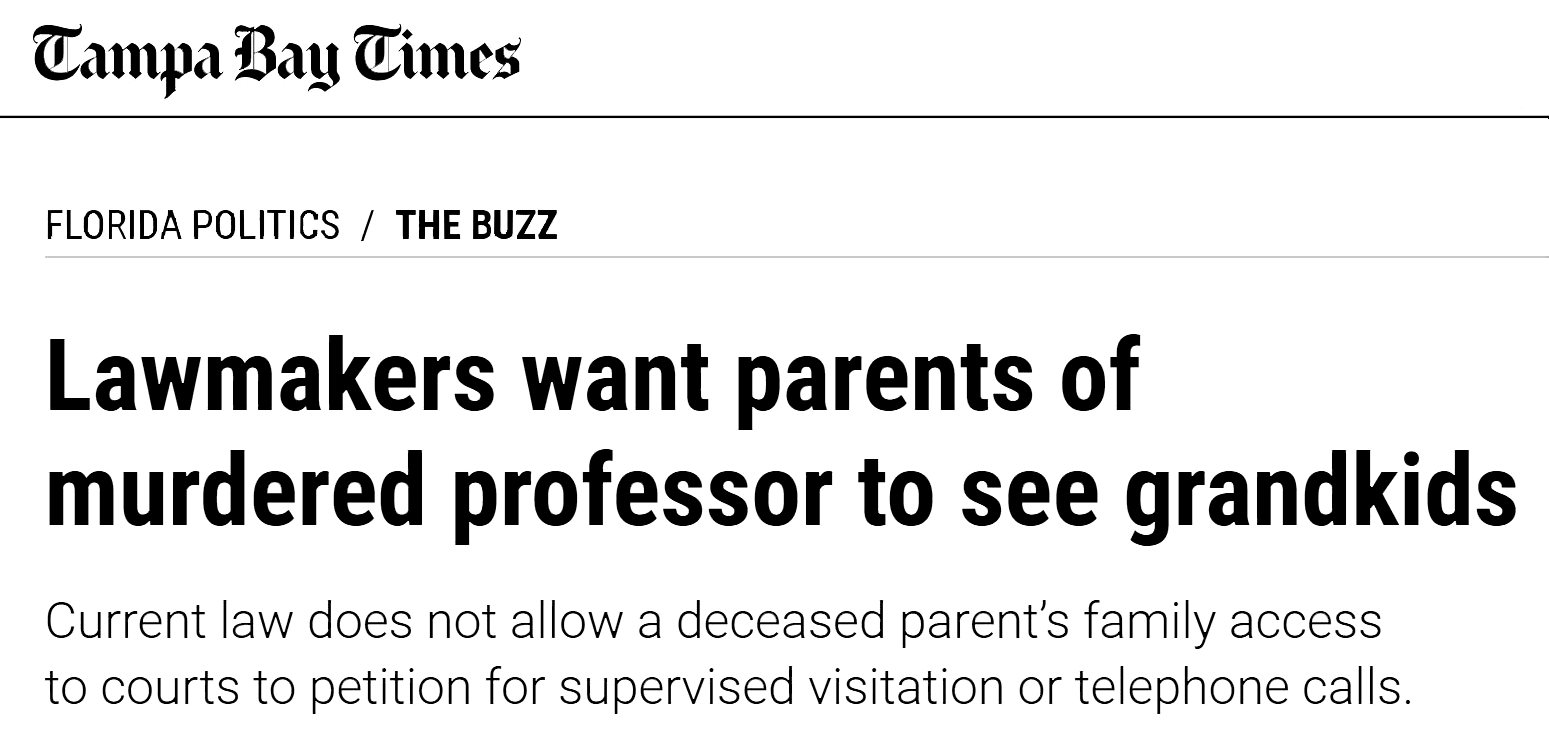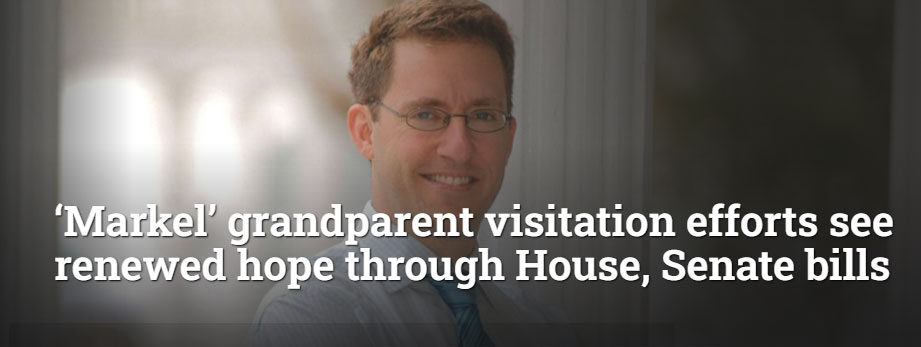Specifically, the bill says that grandparents can petition courts for visitation with their grandchildren where the living parent was found culpable by a criminal or civil court for the other parent’s death.
Inspiration for the bill, sponsored by Rep. Jackie Toledo and Sen. Keith Perry, was the 2014 murder-for-hire of FSU law professor Dan Markel, gunned down in his garage by hitmen, leaving two young sons without a father.
Law enforcement successfully prosecuted three accomplices who they say were hired by the family of Markel’s ex-wife, Wendi Adelson, to execute Markel so that Wendi could move to Miami with the children.
Before the murder, the court denied her petition to move the children away from Markel.
Wendi’s brother, Charlie Adelson, was arrested in April for his role in the murder; authorities named both Wendi and their mother Donna as co-conspirators.
While the terms of HB 1119 don’t fully apply to the Markel murder, as there has been no civil or criminal ruling against Wendi (to date), the new law creates an incentive for a parent to allow visitation with grandparents to avoid litigation. It also creates a powerful disincentive for families to see murder as a workable solution to custody disputes.
For the Markel family, the moment is significant.
“We are so grateful to Gov. DeSantis for signing this bill and for the leadership of House Speaker Chris Sprowls, Rep. Jackie Toledo, and Sen. Keith Perry for carrying the effort forward. This effort came out of tragedy, but we are pleased and hopeful that this initiative will benefit other families,” said Ruth Markel on behalf of her family. “Danny would be proud to know such mountains were moved for the protection of his two beloved sons.”
Lobbyists Jeff Johnston and Amanda Stewart with Johnston & Stewart, along with Markel family friend Karen Cyphers, led advocacy efforts to advance the cause.
“This type of project means so much to our team, knowing that it can help families avoid suffering and alienation from one another,” said Johnston, “We are grateful to Speaker Chris Sprowls, President Wilton Simpson, and the bill sponsors for their vision, and to Gov. DeSantis for signing the ‘Markel Act’ into law.”
Toledo and Simpson share this sense of purpose and gratitude.
“At a time when many Floridians are together with family, some grandparents remain blocked from seeing their grandchildren,” said Toledo, a Tampa Republican. “I am proud to stand up for our most vulnerable, children and grandparents, in extreme and tragic circumstances with this legislation.”
“Time spent between grandparents and grandchildren is important and special, fostering the traditions that tie generations together across all seasons of life. But some families in Florida remain separated due to circumstances beyond comprehension,” said Perry, a Republican from Gainesville. “This bill will provide an opportunity for families who have lost so much already to receive the support and affection from those who love and miss them dearly.”
Cyphers, partner and director of research at Sachs Media and volunteer with Justice for Dan, was moved to help after meeting Ruth and feeling her heartbreak of being alienated from Dan’s sons.
“The tragedy of Dan’s murder was compounded by this cruel, unnecessary separation — but until now, Florida law gave his parents no recourse toward reuniting with their grandchildren,” Cyphers said. “I hope the Governor’s signing of the ‘Markel Act’ into law brings peace and hope to their family and others.”
Ruth Markel’s journey to advocacy began with the loss of her son, Dan Markel, who was murdered in 2014, and the subsequent alienation from his two young children – with whom she and Phil Markel seek reconnection.
Following the arrests of suspects in his murder, the Markels were unsuccessful in their many attempts to gain visitation or even telephone contact with their grandsons, Benjamin and Lincoln. Ruth quickly learned that Florida is one of the most restrictive states in the nation when it comes to providing grandparents with access to courts to petition for visitation with the children they dearly love.
The Markels are grateful to all of the media and social media allies who have given their family a voice to share their desire to reunite with Benjamin and Lincoln. This support is what led Ruth to the next step in her shift to advocacy.
Ruth, in coordination with Florida lawmakers, lobbyists, and allies, is fighting to amend Florida law to expand the ability for grandparents to petition courts for visitation in special circumstances.
This advocacy includes support for reforms to strengthen Florida’s various victim’s rights laws, and to help give a louder voice to victims involved in the criminal justice system.



These efforts have seen renewed hope with a new policy solution that meets both criteria — grandparents could gain the right to petition courts for visitation if the child’s living parent is found responsible for the other parent’s death by a criminal or civil court.
HB 1119, sponsored by Tampa Republican Rep. Jackie Toledo and SB 1408, sponsored by Gainesville Republican Sen. Keith Perry, provide a vision for a path forward that would grant access to courts without compromising Florida’s strong commitment to parental rights.
This effort, informally referred to as “The Markel Act” by advocates, says that if the surviving parent of a child has a criminal or civil finding of wrongful death against them, grandparents are given the ability to petition for visitation with a presumption that such visitation should be granted.
“Grandparents and grandchildren should not be penalized when a child’s parent is found culpable in the wrongful death of the other parent. This Act will benefit grandparents and their grandchildren who need their love and support,” House Speaker Chris Sprowls said.
The effort was inspired in part by the story of Florida State law professor, Dan Markel, who was gunned down in his home in 2014, leaving his two young sons fatherless. Almost immediately after the killing, law enforcement said decisively that Markel was “the intended target” of the killing. But it wasn’t until two years later that a series of arrests in his murder were made.
Sigfredo Garcia and Luis Rivera were named as two hit men who drove to Tallahassee from Miami to commit the crime, and Katherine Magbanua was named as the link between the killers and those who allegedly hired them — the family of Markel’s ex-wife, Wendi Adelson.
Prosecutors say the family’s motive was to secure full custody of the boys for Wendi so she could relocate to South Florida, despite firm court rulings that meant Wendi and the boys were to remain in Tallahassee near their father. Rivera, in his guilty plea, confessed that he and Garcia were hired to kill Markel because “the lady wanted her kids back.”
While friends and family of Markel were relieved for a break in the case, the release of evidence that pointed at Wendi’s family came at a cost. Shortly after the three arrests, Wendi cut off all contact between the children and her former in-laws, Ruth and Phil Markel.
“While arrests of family members are anticipated and seem inevitable, the wheels of justice turn slowly, particularly in complex conspiracy cases such as this,” said Justice for Dan, a grassroots group of Markel’s friends who advocate for justice in this case and for his family. “Despite significant evidence released by prosecutors about the Adelson family’s involvement in the murder, and the troublesome reality that these same family members are raising or supervising Dan’s boys, there has been little hope for the Markels to reunite with their grandsons. This is because Florida law is particularly limited when it comes to the ability for grandparents to petition courts for visitation.”
Making a common-sense fix to Florida’s laws to keep grandparents and grandchildren together in tragic circumstances is exactly what Sprowls, Toledo and Perry sought to do.
The terms of HB 1119 and SB 1408 don’t fully apply to the Markels, as there has not yet been a civil or criminal finding against Wendi Adelson. However, advocates praise this proposal for providing families with the opportunity to consider various options to seek visitation with grandchildren, while protecting and affirming parental rights.
“At a time when many Floridians are together with family, some grandparents remain blocked from seeing their grandchildren,” Toledo said. “I am proud to stand up for our most vulnerable, children and grandparents, in extreme and tragic circumstances with this legislation.”
Perry added, “Time spent between grandparents and grandchildren is important and special, fostering the traditions that tie generations together across all seasons of life. But some families in Florida remain separated due to circumstances beyond comprehension. This bill will provide an opportunity for families who have lost so much already to receive the support and affection from those who love and miss them dearly.”
For their part, the Markels express gratitude.
“We are delighted and encouraged that Florida House Speaker Chris Sprowls has initiated a just, common-sense solution to expand access to courts for grandparents, inspired in part by the story of our beloved son, Dan Markel. We are grateful to Rep. Jackie Toledo and Sen. Keith Perry for advancing these bills, which if passed, would expand access to courts for grandparents like us, who lost a child and then became alienated from their grandchildren,” said Ruth Markel on behalf of the Markel family.
“While we wouldn’t wish this experience on any others, we know we are far from alone in the desire to reunite with grandchildren in the aftermath of tragedy. Losing a child is unthinkable, and we yearn to reconnect with Dan’s sons, Benjamin and Lincoln, and provide them with the love and support we did for so long. We thank Speaker Sprowls, Rep. Toledo, and Sen. Perry, for their leadership, and remain hopeful that both justice and reunification are in our days ahead.”
Peter Schorsch
Petitioning for Visitation: A Guide for Grandparents under Florida’s New Law
By Karen Cyphers, PhD, and Diana Cohn, Esq.
Florida is home to the nation’s largest portion of grandparent-aged residents, and for some, this past year brought new promise in the ability to connect with estranged grandchildren.
HB 1119, known by advocates as the “Markel Act,” was signed by Gov. Ron DeSantis and took effect July 1, 2022. Before this legislation, Florida grandparents had no standing to petition courts for visitation with grandchildren, except in extremely limited circumstances. Specifically, a grandparent could only do so if both of the child’s parents were deceased or in a permanent vegetative state, or the living parent was convicted of a felony.
Inspired by the murder of FSU law professor Dan Markel, the 2022 legislative effort added a new provision to state law (F.S. 752.011). It created an opportunity for grandparents to petition for visitation in cases where a criminal or civil court ruled that the living parent was responsible for the deceased parent’s death.
This new law makes it possible to reunite grandparents and grandchildren in the aftermath of tragedy, but how does one go about “using” the law?
This article will address a few common questions, including how one petitions for visitation, which courts one approaches, how the process works, whether legal representation is necessary, and more.
What if the new law doesn’t apply to one’s family (yet)?
For grandparents involved in cases where a criminal or civil court has not yet ruled against the living parent, the first step is to pursue a wrongful death suit. A consultation with a personal injury attorney will provide a roadmap and options for that process. While not easy or necessarily fast, this step may avoid the need to pursue further action.
Civil litigation tends to be burdensome for all parties involved. The living parent may want to avoid that experience, particularly if questions remain about their criminal involvement in the deceased parent’s death. If that’s the case, they may voluntarily provide grandparents with visitation or access to their grandchildren outside the court system.
If the living parent does not provide this invitation or the grandparents find the conditions of these arrangements unsatisfactory, the grandparents may have to pursue civil action. Their attorney will guide them through that process.
For grandparents with a wrongful death ruling against the living parent, petitioning for visitation includes several steps. We’ll walk through those next.
Which court do you approach, and how is a petition filed?
Under 752.011, petitions for visitation should be filed in the county where the grandchild primarily resides. In other words, if someone lives in Palm Beach County and their grandchild lives in Miami-Dade County, the petition would be filed in Miami-Dade County. The same applies to grandparents living out of state: file the petition in the Florida county where the grandchild primarily resides.
There are many types of courts; the one you’ll need to work with is the Circuit Court.
The petition filing process includes the following steps:
Do you need to hire a lawyer to lead through this process?
In Florida, anyone can represent themselves in court “pro se” – without a lawyer. Doing so may make sense for you if you have a legal background or feel that the facts of your case are clear and undebatable. However, for most people, engaging legal representation imparts several potential benefits, including helping to protect their rights and interests, reducing stress and time spent navigating the legal process, and often resulting in a better or more equitable outcome.
Also, a recent Florida Bar survey found that Floridians who retain an attorney for family law issues are 88% more likely to say they’re satisfied by the legal experience than those who represent themselves.
What factors will the court consider when viewing a petition for visitation?
Under the Markel Act, if a child’s living parent was found criminally or civilly liable for an intentional tort causing the other parent’s death, there is a presumption for granting reasonable visitation with the petitioning grandparent.
This new provision means that a petition has a strong chance of approval if the living parent was found guilty for the deceased parent’s death. However, the courts may weigh additional factors when determining what is in the child’s best interest. Under this section of the law, they may also consider the following:
The statute further lists out other considerations regarding the broader circumstances of the case, including:
The bottom line: You have options, thanks to Ruth Markel and her efforts
If you’re a grandparent who is alienated from a grandchild following the tragic death of your own child, and you believe the child’s living parent is in some way responsible for this death, you have options for recourse.
Ruth Markel, who found herself in this awful position following her son’s murder, fought hard to create this opportunity for other families. Florida’s 2022 grandparent visitation law is the product of these efforts.
“Relationships between grandparents and grandchildren are precious, and I know firsthand the pain alienation brings,” Markel said. “Our effort to change Florida law had you in mind – to help other families avoid the heartbreak felt when separation from grandchildren compounds the tragedy of losing a child. I hope that this guide enhances your ability to navigate the difficult but important road ahead, and that bonds between you and your grandchildren may grow stronger through it.”
To determine the application or value of the Markel Act to your unique circumstances, we would recommend you consult with a family law attorney who is familiar with this specific, new area of law. Diana Cohn, coauthor of this article and early advisor to developing the Markel Act, can be reached at DianaCohnLaw.com. And, the Florida Bar has a directory of legal specialists for others to connect with.
We wish you well in your efforts. Reunification is a goal we share.